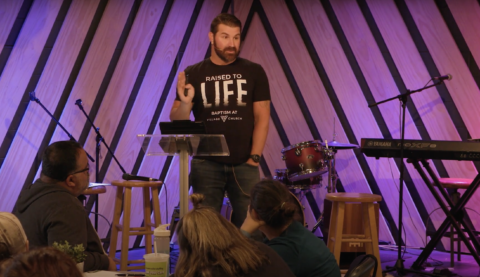Disagreement, opinions, and outrage, OH MY!
If you’ve been alive and awake for the last year, you have probably noticed that the heat has been turned up in the social and political discussions of our day. I only need to spend about one minute (or less) on a news network or social platform to discover a person with an opinion or perspective that has effectively drawn the disdain and outrage of people with an alternative perspective.
Christian, this is where we come in.
James 1:19 – ESV
Know this, my beloved brothers: let every person be quick to hear, slow to speak, slow to anger
In this cultural moment, there is an abundance of people concerned with speaking quickly, and a drought of those striving to hear quickly. This is an opportunity. What if, in our cultural moment, Christians became the best listeners in the world?
If you want to seize the opportunity, then here are four ways to hone your listening skills for the sake of loving your neighbor:
- Minimize Distraction to Maximize Presence
As a person with many responsibilities and tasks, I have an awful tendency to let the next task get in the way of being present with people. I’m growing, but it’s only because the Holy Spirit has to keep reminding me that loving people well is far more important than accomplishing tasks.
But maybe for you it’s not a task that gets in the way. Maybe it’s your phone. Maybe it’s the news. Maybe it’s checking the ticker on the crypto symbols you’ve invested in. Maybe it’s the music or podcast you’re listening to when you could be listening to the person next to you at Starbucks or the person behind the counter.
People are too important to neglect. Your distraction can wait.
The next time you’re around people you don’t live with, maybe try these things:
- Put your phone away
- Maintain eye contact in conversation
- Plan ahead to get your tasks done beforehand
- Push pause when you go through the drive through
- Take your headphones out in the checkout lane
- Restrain Your Impulse to Express Judgement
Recent research has suggested that unchurched people are remarkably more willing to engage in deep spiritual conversation than we (Christians) tend to give them credit for. They just really don’t want to engage in those conversations with Christians.
Why?
They know Christians who are unwilling to let them come to their own conclusions. They believe spiritual conversations with Christians will not be helpful because they’ve experienced the following:
- Christians who appear to have all the answers
- Christians who are quick to point out inconsistencies in other people’s perspectives
- Christians who are good at debating topics
Conversely, 62 percent of non-Christians and lapsed Christians say that a person who listens without judgement would be the best person to talk with about faith.
In a culture full of people quick to express their opinion, Christianity can simply appear to be another opinion-producing agenda machine.
What if, instead of seeking to quickly challenge a point of view that we disagree with, we sought to really understand how a person came to their conclusions?
- Practice Using Empathy Statements
At my seminary, students training to be pastors were notoriously bad listeners. What a gift then, that the counseling department opened up a course built entirely around training us to be good listeners. In that course they gave us one tool and we spent the entire semester practicing the development of that tool.
The tool? Empathy statements. See below:
It sounds like you feel _____________ because __________.
When someone is talking to you, they are trying to share their experience with you. Your goal should be to identify the experience (often a feeling) and what caused that experience. After that, you relate it back to the person in the form of something like the statement above. This shows that you are striving to understand and helps them feel that you care about their experience. Empathy also makes it really easy to ask a follow-up question to take the conversation to a deeper level. Here are some examples:
- It sounds like you were hurt because of some bad church experiences.
- It seems like you’re irritated because your boss has really high expectations.
- I love that you’re excited because you get to spend time with your family next week!
- Study People Who Ask Great Questions
Very few people today know how to ask good questions. But, if we’re learning from Jesus how to interact with people, then we should be the people who ask the best questions! Only eight times in the gospels do we ever see Jesus give a direct answer. But we see him ask over 300 questions. Here are some of them:
- “What are you seeking?” (John 1:38)
- “Do you believe that I am able do this?” (Matt 9:28)
- “But who do you say that I am?” (Matt 16:15)
Jesus knew how to cut to people’s hearts with questions. He gave them space to express their answers and discover what the questions drew out of them. As I strive to love my neighbor better, one of the things I need to grow in is asking better questions.
So I’ll give you some of my next steps for growing in my question asking ability:
- Interview the best conversationalists I know and have them give me their favorite questions (Michael and Breanne Fuelling are two of these people)
- Listen to some of the best podcast interviews and learn from the questions being asked
- Study how, why, and when Jesus asks questions and strive to become like Jesus in the ways that I ask questions
Christians have an opportunity in this cultural moment to become the best listeners. If there is a drought of good listeners in our culture, we can meet that drought with abundance.
So here’s a question we should all sit with: Am I ready to love my neighbor enough to be genuinely interested in them? If your answer is yes, then let’s start honing our listening skills together.






